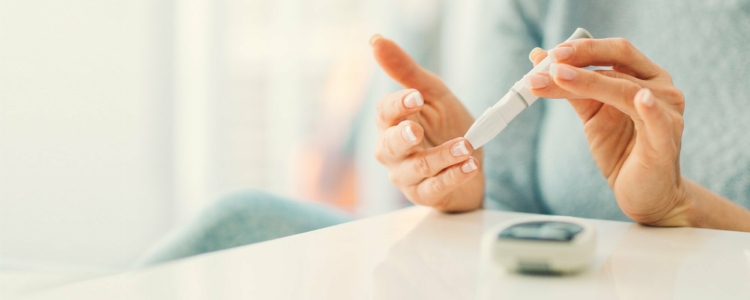1 – Eat healthy
Healthy eating habits will not only help you manage your blood sugar but also your weight. After all, you can help your body use insulin more efficiently by losing as little as 5% of your body weight. We encourage you to enjoy a variety of healthy foods and eat regularly, without skipping meals.
To learn more about the importance of a healthy and balanced diet, please read our full article on food and diabetes management.
2 – Exercise
Whether you have diabetes or not, each week, you should get at least 150 minutes of moderate to vigorous exercise (making you breathe a little harder) over three days. This could be dancing, a brisk walk, swimming, skating or cycling.
Any physical activity you can incorporate into your daily routine will be beneficial, whether it is carrying groceries, playing with your children or grandchildren, taking the stairs or parking your car a little further away. Just try not to skip exercising more than two days in row or sit for long periods of time.
In addition to making you feel good, exercise helps insulin work more efficiently, which helps to prevent diabetes complications or delay the disease for people with prediabetes. Regular exercise also:
- Lowers cholesterol;
- Reduces blood pressure;
- Helps you maintain a healthy weight;
- Improves cardiovascular fitness;
- Reduces the risks of cardiovascular disease;
- Maintains or increases muscle mass;
- Improves strength, endurance and flexibility;
- Improves posture and balance;
- Improves quality of life;
- Improves mental health;
- Promotes better sleep.
3 – Take your medication
Type 1 diabetes requires insulin therapy, which consists of injecting yourself with insulin using a needle or an insulin pump. The number of injections varies from one person to the next, according to their lifestyle and the time of day. So, a health professional needs to determine the dose and the frequency that a person with diabetes needs based on their evaluation.
Type 2 diabetes is usually treated with different kinds of oral medication that help to control blood sugar, whether it is by increasing insulin production, improving insulin response or slowing digestion. In certain cases, medication to lower blood pressure and cholesterol may also be required, as well as insulin injections if there is a significant insulin deficiency.
In any case, your pharmacist affiliated with Accès pharma is always there to help you follow your treatment plan.
4 – Test your blood sugar level
People with diabetes need to control their blood sugar to prevent complications. Self-monitoring your blood sugar level will allow you to better understand what causes the amount of sugar in your blood to fluctuate. This can easily be measured at home using various apparatuses available in stores. The frequency of blood sampling varies from one person to the other, depending on the type of treatment prescribed. To choose the one that is best adapted to you, consult your pharmacist.
Among the most commonly used devices are blood glucose meters, where you place a drop of blood on a testing strip, and continuous glucose monitoring (CGM) systems, which use a sensor inserted under your skin to provide glycemic values in real time. How much insulin you should inject is based on the reading, which can vary according to the time of the day, physical activity, stress level, fatigue, and the food you ate that day.
Here are the target blood sugar levels for most adults with diabetes. If you have any questions, do not hesitate to contact your pharmacist who can help you with your glucose readings.
- Between 4.0 and 7.0 mmol/L on an empty stomach or before a meal
- Between 5.0 and 10.0 mmol/L two hours after the start of a meal
Once you are done taking your blood sugar level, it is important that you properly and safely dispose of used needles, lancets and testing strips, to make sure that no one in your home accidentally hurts themselves. Containers specially designed for this purpose are available at your pharmacy.
In addition to controlling your blood sugar, you should also manage your blood pressure and cholesterol and try to quit smoking to avoid any complications.
The pharmacy has a diabetes monitoring service that offers personalized advice on how to keep track of your blood sugar level and take control of your diabetes. Do not hesitate to talk to a pharmacist affiliated with Accès pharma to find how they can help you monitor your blood sugar and control your diabetes.
5 – Keep daily records
Depending on your treatment, you should test your blood sugar 1 to 4 times a day. So, for better self-monitoring of your blood sugar levels, it is recommended that you keep track of the results in a journal or a special app. The data that you collect will allow you to make a note of any irregular changes in your blood sugar levels, and your journal will also be a useful tool for your doctor and pharmacist.
Several pharmacists affiliated with Accès pharma offer a diabetes monitoring service and blood sugar testing. The pharmacist can work with you and your doctor to adjust your diabetes medication and help you better control the disease. Do not hesitate to talk to your pharmacist and ask for advice.
This information is not a substitute for professional medical advice and pharmacist-owners affiliated with Accès pharma cannot be held responsible for this information. The information was true and accurate at the time of publication, but it is subject to change.






